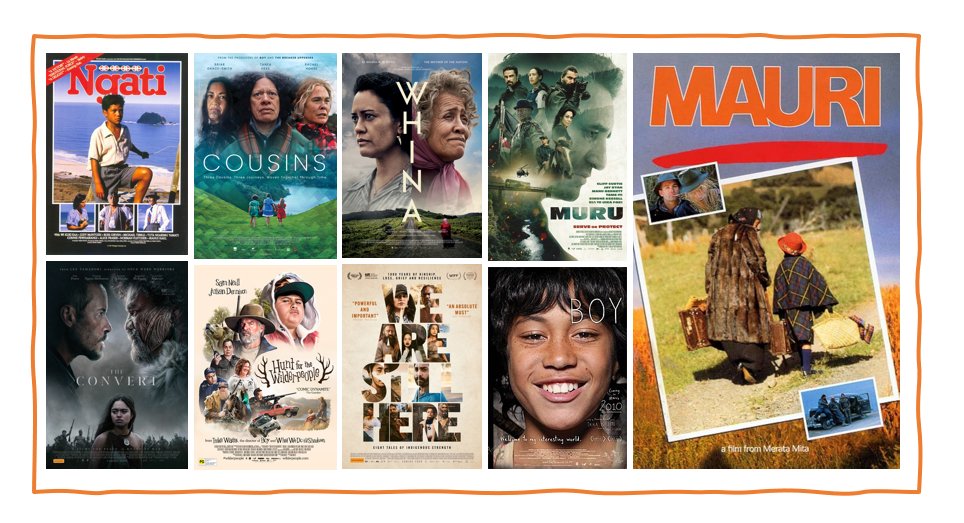Representation Matters
Source: Graphic / Maia Aramakutu (Ngāti Pāhauwera, Ngāti Porou)
At the 2019 Toronto International Film Festival, Taika Waititi (Te Whānau-ā-Āpanui), said this in relation to Indigenous representation on screen:
“I think it all comes down to putting the power back into the hands of people who own those stories. I think the only way you can authentically tell a story from a particular place is to get a person from that place – someone who knows the content and knows the place to tell it.”
Here, Waititi emphasized the importance of Māori sharing Māori stories, so that the representation of Māori and te ao Māori is authentic.
Throughout the history of film in Aotearoa, Māori stories have been told through a white lens; therefore, the representation of Māori has often fit the colonial image of Māori identity.
This is the portrayal of Māori as the ‘noble savages’. This includes stereotypes of people who are living in harmony with nature, are stupid, can be violent, and who are physical rather than intellectual. This portrayal, which perpetuates harmful colonial stereotypes, appears in films such as Rewi’s Last Stand (1940), Utu (1983), and The Piano (1993), which are all made by white directors.
When asking other UC Māori ākonga if it is important for them to have authentic Māori representation in films, and if they think it’s important for Māori to make Māori films, the common response to both questions was yes.
One ākonga said, “I think it’s really important for Māori to tell Māori stories because accurate portrayals are good – but authentic portrayals are better. And only Māori can tell authentically Māori stories.”
Another ākonga responded, “I think that it is crucial to leave the retelling of Māori stories to Māori. Otherwise, it is inauthentic and unfair to let someone else narrate your whakapapa.”
In more recent years, we have seen more Māori enter the Aotearoa New Zealand film industry. Many have focused on sharing Māori stories and portraying Māori authentically.
One of the most famous examples of a Māori filmmaker is Waititi, who directed the New Zealand classics Boy (2010) and Hunt for the Wilderpeople (2016). These movies encapsulate what it means to authentically represent Māori on screen, as the central characters of Boy and Ricky Baker feel like real people rather than stereotypes.
Another example of the importance of Māori telling Māori stories is through the movie Muru (2022), directed by Te Arepa Kahi (Ngāti Paoa, Tainui). Muru is a response to the New Zealand Police raids against the Tūhoe community of Rūātoki, as well as the 1916 governments raids in Rūātoki to arrest Rua Kenana.
This film is extremely impactful and will make you feel a wide array of emotions upon viewing. The characters in Muru are portrayed as real people, who are put in a situation which is unfair and out of their control. Elements of community are strong throughout this film and paint a realistic picture of what it is like for rural Māori.
“We’ve seen […] throughout the history of Māori on screen that there hasn’t been a lot of authenticity in the portrayal of Māori, so it’s really refreshing to see that being righted,” said one Māori ākonga.
It is important that Māori are reclaiming and telling Māori stories. This is because if we are in control of the narrative told about Māori, and of the representation of Māori identities, this can show people what it really means to be Māori – while also celebrating Māori culture.
Although there are still a limited number of Māori-made films, the Māori film industry is continuously growing. As one UC Māori ākonga said “I don’t really think I’ve seen myself represented on screen – expect maybe in Uproar [a 2023 film starring Julian Dennison].”
In March of 2024 alone, there are two Māori-made films releasing in cinemas. One is The Convert, directed by Lee Tamahori (Ngāti Porou), about a preacher in the 1830s who comes to New Zealand to settle and finds himself caught in a war between iwi. The other is Mountain, directed by Rachel House (Ngāti Mutunga, Te Ātiawa, Kāi Tahu), about Sam, a young Māori girl who wants to connect with maunga in the hope that it will help her beat cancer. You should check these films out; I know I will.

